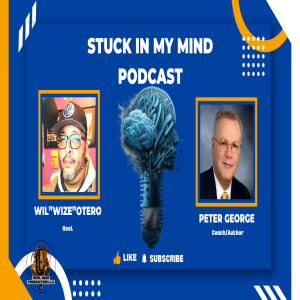
In this enlightening episode of the "Stuck In My Mind Podcast," host Wize El Jefe is joined by esteemed public speaking coach Peter George for a deep dive into the art and evolution of public speaking. Titled "From Stutter to Stage: Peter George's Public Speaking Journey," the conversation explores both historical and modern facets of effective communication and engagement with an audience.
Peter George, a seasoned public speaker with over 30 years of experience, candidly shares his inspiring journey overcoming childhood speech impediments, including a lisp and stutter. These early challenges ignited his quest for mastery in communications, ultimately leading to a transformative career as a public speaking coach. With a focus on helping others harness their unique strengths, Peter reveals his personal evolution and the insights that have shaped his coaching philosophy.
The episode delves into the historical trajectory of public speaking—from the grand orations of the past to today's more conversational, concise formats, likened to the influential TED Talks, typically capped at 18 minutes. In contrast to lengthy historical speeches, such as the two-hour oration preceding President Lincoln's renowned three-minute Gettysburg Address, modern techniques prioritize engaging dialogues and audience connection. Wize and Peter discuss how the richness of stories, interactive questions, and the speaker's body language play critical roles in keeping an audience captivated.
Central to Peter's approach is the AMPD framework—a strategic guide for speakers that emphasizes Audience engagement, crafting a clear Message, tailoring the Presentation to different groups, and ensuring impactful Delivery. This methodology reflects Peter's belief in focusing on serving the audience and creating transformative experiences. He stresses the importance of empathy and engagement over sheer information dissemination, echoing the episode’s underlying narrative about the potency of listening and adapting to audience needs.
Throughout the conversation, Peter underscores the significance of storytelling in speeches, emphasizing stories' memorability and power to impart morals and messages effectively. Aligning storytelling with structured presentation elements, his insights illustrate how narratives can bridge the gap between a speaker's objectives and the audience's interests.
Peter shares various anecdotes, including memorable lessons from his great grandmother about distinguishing between criticism and constructive critique. He also reflects on his father's influence, a firefighter, and how these experiences informed his values and career choices. Further, Wize El Jefe offers his journey from an audio-only to a video-inclusive podcast, underscoring the inevitability of imperfections and the importance of adapting for growth and audience connection.
Wize and Peter also tackle the common psychological barriers in public speaking. Peter normalizes nerves as a natural precursor to an exciting endeavor, offering strategies to reframe nervousness into an asset rather than a hindrance. They analyze frequent public speaking mistakes, like self-centered content over audience-focused narratives, and provide practical tips to improve delivery and maintain engagement.
The episode isn't just a roadmap for aspiring speakers seeking improvement, but also a heartfelt reminder of the joy found in helping others. Both Wize and Peter share a deep-seated passion for positively impacting lives through their respective crafts of podcasting and public speaking. They discuss the satisfaction of sharing stories and the unseen impacts of their work, making this episode a compelling listen for anyone interested in effective communication and personal growth.
Listeners are encouraged to explore public speaking via local platforms like Toastmasters and to pursue continuous practice as a means of refining their craft. With special thanks to their audience and community, the episode concludes with a nod to collaboration, lifelong learning, and the significance of public speaking not just as a practice, but as a vital tool for connection and leadership.
No comments yet. Be the first to say something!